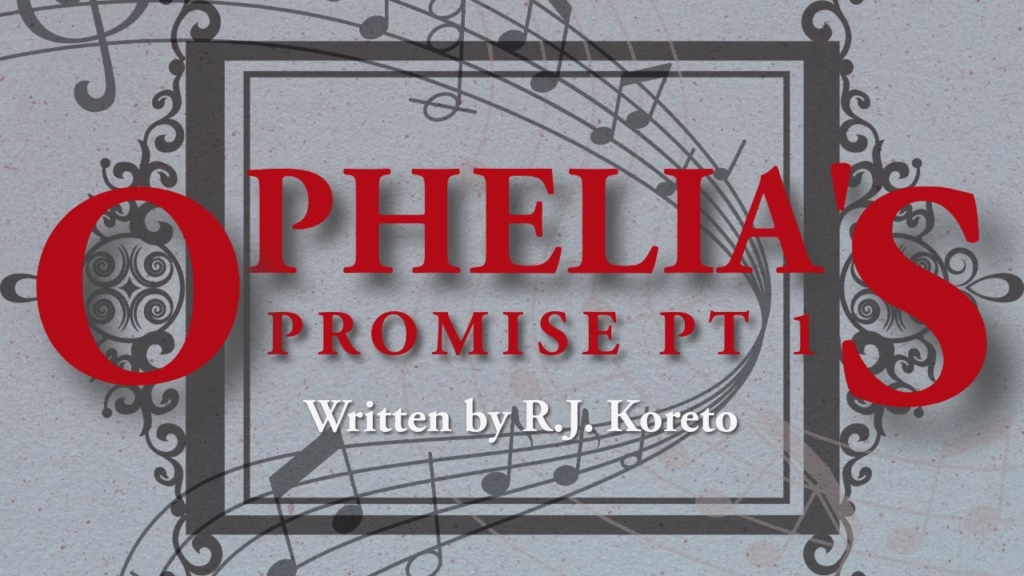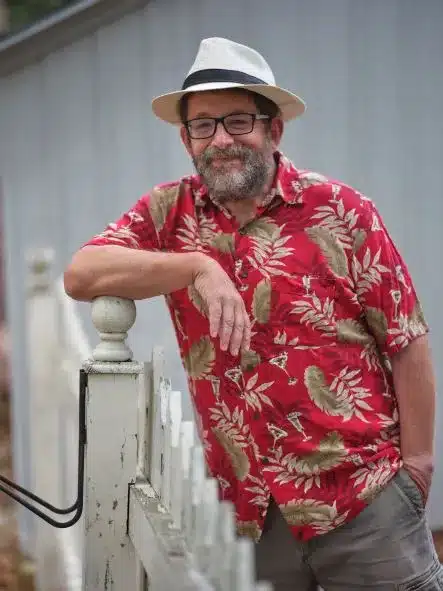Welcome back to a Christmas of short stories from the Crew and friends! Today, we are welcoming our friend author, R. J. Koreto, in the first part of a two-part collaborative story from R.J. Koreto and Lou Kemp titled Ophelia’s Promise.
If you’d like to listen to this story read aloud instead, you can do so on our YouTube channel or by watching the link below.

Ophelia’s Promise: Part 1
Inspector Claudia Culpepper stood in front of Professor Roderick Makepeace’s desk. She was always the super’s first choice whenever academia was involved. “You speak their lingo. I’d rather face a Brixton gang than deal with that lot.”
Makepeace took the paper from her and waved a hand casually as he contemplated the document. Culpepper took that as permission to sit in the Victorian-style chair.
“It’s not by Sir Edward Elgar,” Makepeace finally said. His eyes flashed at her. “He was a well-known composer of the late nineteenth and early twentieth centuries.”
Ah yes. The expected patronizing remarks.
“Of course, I’d have to study the music in more detail to draw a conclusion, but this is just wrong for any serious music. I see this is clearly a photocopy. Was there an original manuscript?”
“Yes. It was handwritten on plain paper and bound with a gold cord.” She paused. “This photocopy was found next to a murdered body. We had assumed Elgar—he was so British.”
“Ha! I didn’t think CID would involve itself in musical history unless a murder was involved. How about you, inspector? I suppose at your age, pop music is more your thing?” He made it sound like a crime against humanity.
“I look younger than I actually am,” she said, not quite answering his question.
Makepeace frowned. “The melody…the chord pattern…it’s not anything I’m familiar with. It’s almost like it was written by two people…I see a Mozart pattern here…” His voice trailed off, and then he fixed Culpepper with a look. “I’m an authority on classical English music, but I think there is more of a Germanic tone here. You want to know more about it—Elgar or not?”
Ha, now he’s curious, thought Culpepper.
“Thank you, sir. We would greatly appreciate it if you could get back to us if you have any insights.” She gave him her card and left.
Okay, not Elgar. A shame, really. She had found out that Elgar had written “A Christmas Greeting, Op. 52,” and it would have been a perfect clue for a murder committed during the Christmas season, although Elgar was by no means the only possible composer. It would make sense as it was found next to the body of a murdered classical music critic, Arthur Bascombe. Bascombe was a particular champion of English composers but was familiar with many others. Who killed him—and why? An expensive watch was still on his wrist, and a wallet full of cash was still in his pocket.
Culpepper checked her phone, confirming the next person on her list: Bascombe’s editor—Maura Devika.
When she arrived, the editor was more welcoming than the professor, immediately showing Culpepper to a seat in her cluttered office and offering her coffee.
“I feel awful.,.” Devika gestured at the office. “All the Christmas garlands and tinsel, and we’re mourning Artie. We worked together for a decade. A robbery, I assume?”
“We don’t think so,” said Culpepper. “It may have been something personal. He was holding a photocopy of some handwritten music, but we haven’t been able to identify it. Was Bascombe perhaps a composer as well as a critic?”
“No—he had wanted to, when he was young, but had given that up. He loved music but had no talent for composing. He knew it. He didn’t like it, but he knew it.”
“Maybe this,” Culpepper pointed to the copy, “is from someone he knew—or a colleague, or someone he was mentoring?” asked Culpepper.
Devika sighed and ran her hand through her hair.
“Oh yeah, ‘mentoring.’ Might as well call it that.”
Culpepper was silent. She knew she’d get an explanation eventually.
“For a guy on the far side of 50, he was very active. He never married but had a lot of young women, would-be musicians, whom he ‘mentored.’ I don’t think I have to explain that to a sharp girl like you.”
Culpepper cocked her head at Devika. “You might, actually. What kind of musicians did he mentor? His field was classical music. So these were…aspiring violinists?”
That gave Devika a moment’s pause. “You know, that’s very interesting. I’ve never heard of a violinist sleeping her way into an orchestra. But these women he ‘mentored’ tended to be would-be rock stars. He played up his newspaper connections and dressed well. And even if he reviewed classical music, he knew the whole music scene.”
“Was there someone recent?”
“Maybe one of the girls killed him because she found out he was using her?”
Culpepper smiled and shrugged. “Just routine. We have to talk to everyone. What else do you know about the girls?”
“There was nothing formal. But there was one he wrote about in his column. It looks like she is actually beginning to make a name for herself—Ophelia. There’s your musical connection, right? I don’t know her last name. But she sings for a band called…oh, what was it again…Black Scandium.” Of course, Scandium, is a metal first discovered in Scandinavia.
“Thank you. I’ll see if I can find this Ophelia. I don’t suppose you know of anyone who disliked him? Anyone he had arguments with?”
Devika laughed. “He was an arrogant womanizer, but if someone was going to kill him for that, he’d have been dead years ago.”
Back on the street, it only took Culpepper a few minutes to find the club where Black Scandium was playing—very near to the alley where Bascombe’s body was found.
It was barely evening. The club was actually a step or two above the usual dives. Most of the lights worked, and there was plenty of foot traffic going by. But there wasn’t even an attempt at holiday cheer here. Culpepper squinted and could see a dim light through the dirty window She rapped on the door. A few moments later, she heard a voice yell, “We’re not open yet.” She kept rapping until a surly-looking man came to the door. She held up her warrant card—and the door opened. He still looked surly.
“What did we do now?” he asked.
“Nothing that I know of,” said Culpepper. “You had a band here last week: Black Scandium. They have a singer named Ophelia. I am trying to reach her.” He didn’t say anything, so she added, “She looks like a waif with dreamy eyes and long black hair.”
He frowned. “Wait here.” When he returned, he said, “Go on up. She has the flat on the top floor.”
Listen to Ophelia’s Promise: Part 1
Read Part Two of Ophelia’s Promise by Lou Kemp
About RJ Koreto

Over the years, R.J. Koreto has been a magazine writer, website manager, textbook editor, novelist, and merchant seaman.
He was born and raised in New York City, attended the Fieldston School, and graduated from Vassar College. He has wanted to be a writer since reading The Naked and the Dead.
In addition to his novels, he has published short stories in Ellery Queen’s Mystery Magazine, Alfred Hitchcock’s Mystery Magazine, the 2020 Bouchercon Anthology, and Paranoia Blues: Crime Fiction Inspired by the Songs of Paul Simon.
With his wife and daughters, he divides his time between Rockland County, N.Y., and Martha’s Vineyard, Mass.
Find him at https://rjkoreto.com/
Check out our review of R.J. Koreto’s recent book, The Turnbull Murders, an MRC Recommended read!






Great Part 1 ! Just love a good mystery. Hope curiosity drives a reader to part 2 😉